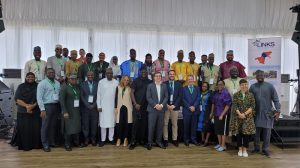Since 2021, the UK Government’s LINKS programme implemented by Tetra Tech International Development has been piloting a couple of climate smart farming initiatives, helping farmers to increase yields and become more resilient in the face of climate change while reducing greenhouse gas (GHG) emissions.

At a Climate Smart Agriculture results and lesson sharing event which held in Abuja on Wednesday, May 24, 2023, LINKS demonstrated that the project is starting to deliver impressive results, particularly the Systems of Rice Intensification – SRI, a climate smart agricultural practice which is said to be a different way of producing rice that reduces input costs by 50%, with less use of water, doubling yields for farmers and reducing GHG emissions.
SRI involves early transplanting of seedlings and wide spacing to allow the plants to flourish, alternative wetting and drying rather than flooding and the use of organic rather than chemical fertilisers.
A further benefit for wider society is the overall climate impact delivered by SRI. Rice production traditionally produces methane (globally contributing approximately 2.5% of all human induced GHG emissions, roughly the same as international air travel) and this is set to grow in Nigeria with increasing consumption and production of paddy rice.
Speaking at the event, Team Leader, LINKS programme, Andrew Thorburn, said: “Farmers were sceptical at first but after 4 seasons we now have over 26,000 farmers in Kano, Kaduna and Jigawa actively using SRI. The use of organic rather than chemical fertilisers equally meant that soil quality further improves every season which continued to deliver improved results as well as increased resilience to changing weather, especially flooding.”
British Deputy High Commissioner in Lagos, Ben Llewellyn-Jones, represented by the FCDO Climate and Nature Lead in Abuja, Martine Sobey, said: “The UK Government has a strong focus on supporting Nigeria to deliver its international climate commitments.
“We are particularly pleased to note that the Systems of Rice Intensification – SRI reduces the GHG emissions produced by rice growers by as much as 40% and look forward to seeing SRI expand throughout Nigeria.”
At the event participants heard from farmers based in Kano and Jigawa who were trained to use the SRI method explain how the change had benefited their lives and that of their communities.
They also heard from Silvex International, a LINKS partner and aggregator who is planning to expand SRI to over 1,000 hectares in the coming years that will ensure benefits throughout the value chain. With this positive start, SRI is set to help Nigeria on the road to rice self-sufficiency as well as improving the environment for all.
The LIKS programme – Powering Economic Growth in Northern Nigeria – is a £12 million UK government funded programme designed to support the development of a vibrant, inclusive, and diversified economy in three Northern Nigeria States of Kano, Kaduna and Jigawa. LINKS primary objective is to develop high potential pro-poor value chains supporting them to be productive, competitive, and attractive for investment at every level.
Systems of Rice Intensification (SRI) is a climate-smart practice that increases the productivity of rice and reduces methane emissions. SRI uses a cultivation system of alternate wetting and drying to create aerobic soil conditions that reduce the production of methane. It uses less seeds and less water, whilst significantly increasing yields. As such it can increase farmer incomes whilst reducing GHG emissions.
Tetra Tech International Development delivers international development programmes around the world, focused on areas including economic growth, agriculture, governance and democracy, energy, and infrastructure, for clients such as UKAID, USAID, the European Union, the European Investment Bank, the World Bank, the United Nations, and other donors and funding agencies.
